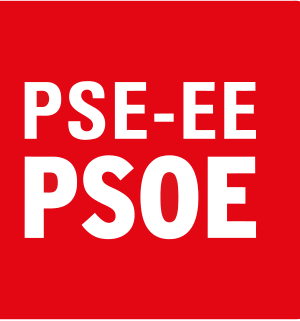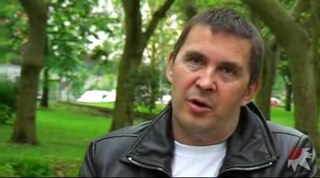
The politics of Spain takes place under the framework established by the Constitution of 1978. Spain is established as a social and democratic sovereign country wherein the national sovereignty is vested in the people, from which the powers of the state emanate.

Basque nationalism is a form of nationalism that asserts that Basques, an ethnic group indigenous to the western Pyrenees, are a nation, and promotes the political unity of the Basques, today scattered between Spain and France. Since its inception in the late 19th century, Basque nationalism has included separatist movements.

The Basque Nationalist Party, officially Basque National Party in English, is a Basque nationalist and regionalist political party. The party is Christian-democratic, with social-democratic and conservative-liberal factions. It operates in all the territories comprising the Basque Country: the Basque Autonomous Community and Navarre in Spain, and in the French Basque Country. It also has delegations in dozens of foreign nations, specifically those with a major presence of Basque immigrants.

The People's Party is a conservative and Christian-democratic political party in Spain.
Regionalism is a political ideology which seeks to increase the political power, influence and/or self-determination of the people of one or more subnational regions. It focuses on the "development of a political or social system based on one or more" regions and/or the national, normative or economic interests of a specific region, group of regions or another subnational entity, gaining strength from or aiming to strengthen the "consciousness of and loyalty to a distinct region with a homogeneous population", similarly to nationalism. More specifically, "regionalism refers to three distinct elements: movements demanding territorial autonomy within unitary states; the organization of the central state on a regional basis for the delivery of its policies including regional development policies; political decentralization and regional autonomy".

The Union of the Democratic Centre was an electoral alliance, and later political party, in Spain, existing from 1977 to 1983. It was initially led by Adolfo Suárez.

The Spanish transition to democracy, known in Spain as la Transición or la Transición española, is a period of modern Spanish history encompassing the regime change that moved from the Francoist dictatorship to the consolidation of a parliamentary system, in the form of monarchy under Juan Carlos I.

The 1982 Spanish general election was held on Thursday, 28 October 1982, to elect the 2nd Cortes Generales of the Kingdom of Spain. All 350 seats in the Congress of Deputies were up for election, as well as 208 of 254 seats in the Senate.

Christian Democratic Team of the Spanish State was a political alliance of the Democratic Union of Catalonia, the Federation of Christian Democracy and other regional parties. EDCEE contested the 1977 general elections in Spain in alliance with Catalan centrist forces. The alliance got 215,841 votes.

The Socialist Party of the Basque Country–Basque Country Left is a social-democratic political party in the Basque Country that acts as the regional affiliate of the Spanish Socialist Workers' Party (PSOE).

Spain is a diverse country integrated by contrasting entities with varying economic and social structures, languages, and historical, political and cultural traditions. According to the current Spanish constitution, the Spanish nation is the common and indivisible homeland of all Spaniards, composed of nationalities and regions which the constitution recognizes and guarantees the right of self-government.

Both the perceived nationhood of Spain, and the perceived distinctions between different parts of its territory are said to derive from historical, geographical, linguistic, economic, political, ethnic and social factors.

Gabriel Cisneros Laborda was a Spanish attorney and politician who is mostly known for being one of the Fathers of the Spanish Constitution of 1978 He is also credited with collaborating in the writing the European Union's Declaration of Human Rights.
The Juntas Generales are representative assemblies in the Southern Basque Country that go back to the 14th century. They are the Foral Parliament of the Basque Country were - and are - Foral Parliament of Biscay, Foral Parliament of Gipuzkoa, Foral Parliament of Alava, Foral Parliament of Navarre and Parliament of Navarre and Béarn. The equivalent in Navarre was the Cortes—or The Three States, roughly House of the Commons—to become the present-day Parliament of Navarre.

EH Bildu, short for Euskal Herria Bildu is a left-wing, Basque nationalist, pro-independence political coalition active in the Spanish autonomous communities of Basque Country, Navarre and Burgos Province.

Abertzale left is a term used to refer to the parties or organizations of the Basque nationalist/separatist left, stretching from democratic socialism to communism.

Eusko Alkartasuna is a Basque nationalist and social-democratic political party operating in Spain and France. The Basque language name means Basque Solidarity and abbreviated as EA. The party describes itself as a "Basque nationalist, democratic, popular, progressive and non-denominational party". Recently, the party adopted the slogan "Euskal Sozialdemokrazia".

María Teresa Pagazaurtundúa Ruiz, better known as Maite Pagazaurtundúa or Maite Pagaza, is a Spanish politician, activist and writer. She is currently a Member of the European Parliament, and spokesperson of Unión Progreso y Democracia in the European Parliament.














